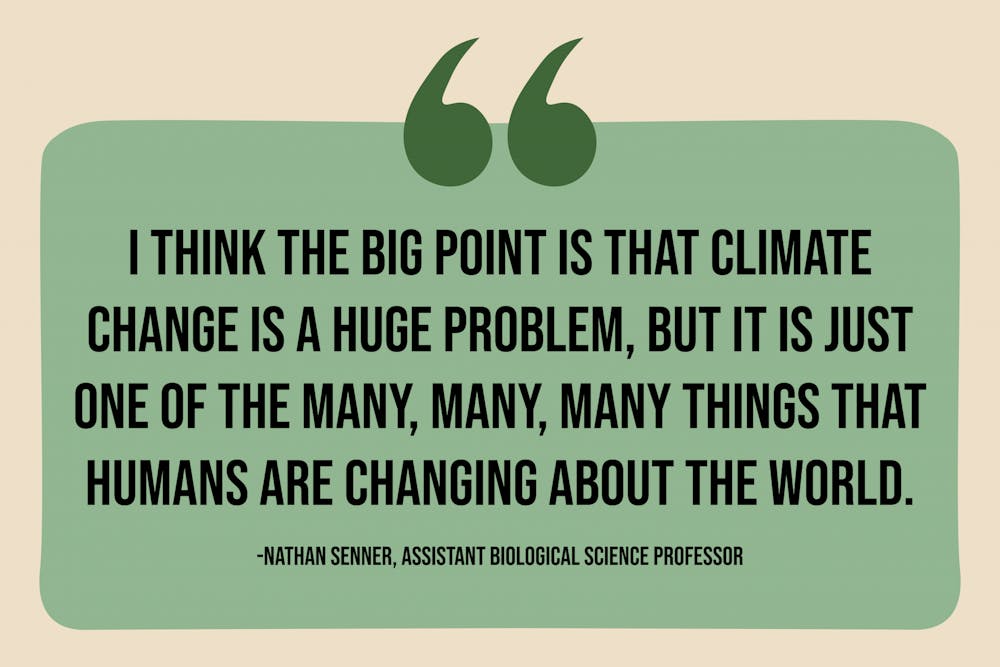Spring is here, and everything is ready to bloom again. Plants will blossom and animals and insects will return, but with the exponentially changing climate and human impact on the environment, the future may not look comforting. While experts don't expect at-risk plant and animal species to fade out this spring, they said they are concerned for their well-being from this point forward.
Nathan Senner, an assistant professor in the department of biological science, said the earth is warming and there are very few areas that the human race hasn’t inhabited. Widespread human habitation is becoming an increasing cause for extinction — making humans the driving force for these plummeting populations.
“I think the big point is that climate change is a huge problem, but it is just one of the many, many, many things that humans are changing about the world," Senner said. "If you're already dealing with habitat loss and lots of disturbance ... and then you put climate change on top of it, that's when it becomes too much.”
While global warming caused by emissions of greenhouse gases is affecting species, Senner believes that human habitation is currently pushing it to go extinct at a much faster pace.
“Human-caused habitat loss is still the predominant driver of extinction with overexploitation in terms of overfishing or overhunting, then being the second one, and climate change is, in a way, sort of the cherry on top,” Senner said.
While the majority of the problem will likely not show itself this spring, global warming is still making an increasing impact on plants and animals, according to Claudia Benitez-Nelson, Associate Dean in the College of Arts and Sciences. With the interconnectedness of the environment, slight increases in temperature can make a big impact. An example of this would be the dwindling numbers of pollinators.
“They're not pollinating as much, they're not being as successful, could be for a variety of reasons, climate really seems to be involved in that — in terms of getting too hot. Not with the plants blooming at different times and just life cycles not being in sync,” Benitez-Nelson said.
Carol Boggs, a professor in biological sciences, said there are two ways that a species may adapt to changing climates. One being plastic responses, observable physical changes which can happen at a quicker pace, and the other being evolutionary changes — which are part of genetic makeup.
Benitez-Nelson also said most plants and animals will be here this spring, but not many will be able to adapt to their changing environment as climate change is only getting worse.
It depends on the species, but some of them are able to adapt by relocating. As the climate gets warmer, some species will not be able to withstand the heat, so moving locations is a possibility for them, Boggs said.
“Things are evolving and changing and all of these different plants and animals are being stressed. And was it gonna happen this spring? I don't know. But I can tell you in 10 springs. Yeah, they're all gone,” Benitez-Nelson said.
Senner said this global problem needs individual participation.
“I do think that one thing that we are really starting to see is the value of very local scale efforts to improve the quality of habitats, and that can start in your backyard,” Senner said. “Certainly, voting with the conscience in mind for biodiversity issues and climate change-related issues is also another way.”
Boggs also said the average person could do more to help the environment.
“Pay attention to your own carbon footprint, it's a relatively minor thing. But nonetheless, it has a small impact. Push for climate, carbon footprint reduction on the part of corporations or on the part of municipalities or states,” Boggs said.
Individual efforts by monitoring how much one consumes is a good place to start with helping the climate. Additionally, advocacy and educating people can go a lot further.
“Make your voice heard. Talk about it, talk about it with your friends, talk about it with people who aren't your friends, right? Talk about it outside your group. And have that conversation, don't be confrontational, but be more informational and provide resources,” Benitez-Nelson said.
Benitez-Nelson said she has great faith in the students she is teaching. The fight for climate justice is just beginning. She thinks the generation of students right now will be the ones to clean up the mess of past generations.
“Let's invest in you to help us figure it out. And I don't mean invest in you in 20 years. No, no, let's invest in you now,” Benitez-Nelson said.

